William Thomas 'Bill' Grew, the son of a pawnbroker, was born and brought up in Chelmsford. After education at the town’s Grammar School he joined the Royal Air Force early in the war. After training in Canada he was posted to a Bomber Command squadron. He married early in 1944. He was killed in September 1944 when his Halifax aircraft was shot down in The Netherlands on its return from a raid in Germany. It was his 31st operational flight. His parents lived in Moulsham Street, Chelmsford.
William Thomas GREW, Flying Officer (Air Gunner), 78 Squadron, Royal Air Force Volunteer Reserve
Killed when his aircraft was shot down in The Netherlands. Aged 22
He was educated at King Edward VI. Grammar School, Chelmsford. He trained at a hatchery when he left school. At 17, he was the youngest chick sexer in the country. At 18, he joined the Air Force. ‘He was mad to go,’ said his father. He went to Canada for his training and incidentally had a wonderful time there. Then he came back. He has been on operations ever since.
And he does not think he will find any difficulty in settling down to a nice peaceful life again after the war."
At the start of 1944 Bill was mentioned in an article in the Essex Chronicle:
“The laughing red ‘devil’s head’ which hangs proudly in the saloon bar of the White Horse inn at Great Baddow has jut completed 29 operational flights over enemy territory. It is a Gremlin, of the benevolent kind. The word Gremlin is derived from the word Greminal which means ‘a bosom friend.’
It was one morning last June that Pilot-Officer W. T. Grew, of Chelmsford, saw the grinning mask in the White Horse. ‘I’d like that for a Gremlin’, he said to the landlord, Mr. Charlie Smith. ‘Ssh! it’s the wife’s’, whispered Mr. Smith. ‘It was given to her by our son when he was a boy. He’s now in the R.A.F.’
But Pilot-Officer Grew insisted, ‘Take it’, said Mr. Smith, ‘only for goodness sake don’t say I told you to take it. And bring it back.
Pilot-Officer Grew took it. Now it is back again, but only for a time. The ‘certificate of merit’ which is underneath it says:
Dusseldorf, Maanheim (two), Mulheim, Krefelds, Cologne (two), Munich, Hannover (two), Essen, Cannes, Montlucon, Hamburg (four), Wuppertal, Gelsenkirchen (two), Nurenburg (two), Renchild, Bochum, Milan, Berlin. This is to certify that the above 26 operational flights were completed by Gremlin Chaser No. 1.
Then follow the names of the crew: Rear gunner, Sgt. J. Southworth; navigator, P.-O. O. Weere; bomb aimer, P.-O. R. Sloggett; wireless operator, Sgt. S. Hemson; mid-upper gunner, P.-O. W. T. Grew; engineer, P.-O. E.A. Newman; pilot, Flight-Lieut. J. Montgomery D.F.C.
‘We came out almost untouched from all those ops. - only two small holes’, Pilot-Officer Grew said. He is the son of Mr. and Mrs. T. H. Grew of Moulsham Street, Chelmsford. ‘We have great faith in our Gremlin. I think our most exciting trip was over Berlin - one of the first of the present series. Our luck held good. When I go back on ops. again I shall take the Gremlin with me. You see, we should feel lost without it. You get attached to Gremlins. We shall put it back in its place - in the bomb aimer’s position in the nose of the aircraft’.
While over Berlin Gremlin Chaser No. 1 got a couple of direct hits on a German fighter, which ‘just broke up in bits’. For a moment, it seemed the Gremlin’s laugh was real. It laughed, excitedly, so it seemed, with the rest of the crew as the wrecked German aircraft plunged to earth. ‘Good old Gremlin’, said the crew of Gremlin Chaser No. 1."
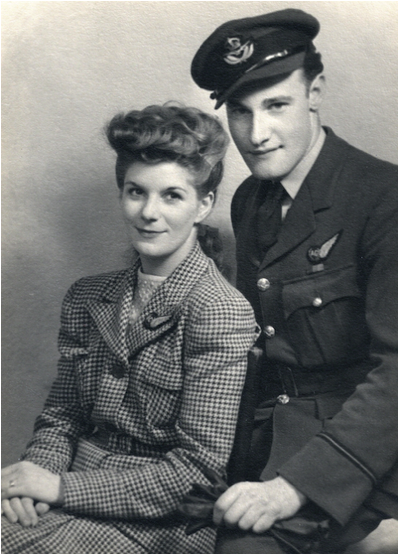
Bill was born in Chelmsford in 1922, the son of Suffolk-born pawnbroker Thomas George Collier Grew (1892-1976) and Ethel Winifred Grew (nee French) (1892-1972).
Bill’s parents had married at St. Paul's Church, Long Lane, Finchley, Middlesex on 9th June 1918 and seem to have settled in Chelmsford soon after the conclusion of the First World War. During that war Bill's father had served as a Sergeant with the 13th Battalion of the London Regiment.
Bill was baptised at St. John’s Church, Moulsham on 8th October 1922. At the time his father was a pawnbroker’s manager living at 25 Moulsham Street, Chelmsford.
Bill had an elder sister and two younger brothers, all born in Chelmsford and christened at St. John’s Church Moulsham between 1920 and 1933.
On each occasion their father was a pawnbroker living at 25 Moulsham Street.
Bill, like many sons of local businessmen was educated at King Edward VI's Grammar School in Chelmsford. After leaving school he worked at Hallmark Hatchings in Wickford.
In February 1939, when aged 16, Bill was cycling in Bridge Street, Writtle when he collided with a 41 year-old pedestrian George Hamilton Love whose skull was split front to back. Mr. Love died in hospital later. At the inquest, which returned a verdict of accidental death, the jury said that there was ‘fault on both sides.’
At 18 with Britain at war, Bill joined the Royal Air Force and went to Canada for training. As Flying Officer (Air Gunner) 159102 he was posted to 78 Squadron, Royal Air Force.
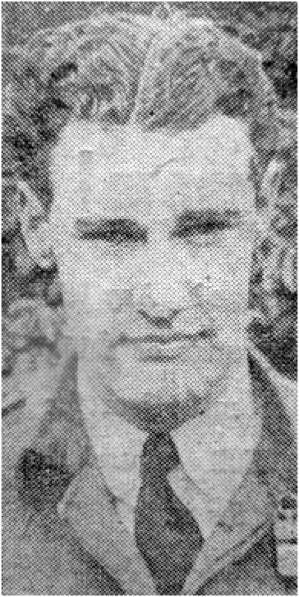
In 1943 the Essex Chronicle carried a report featuring Bill:
“Chelmsford Flier in Berlin Bombing - Home on leave on Saturday night came Sergeant-Air-Gunner William (better known as ‘Bill’ Grew, to Moulsham Street, Chelmsford, after bombing Nuremburg on Friday night, and Berlin a few nights before that.
Nuremburg was Sgt. Grew’s 19th trip since he first started on operational flights this year. He ‘kicked off’ as he put it, with Dusseldorf. The rest of the list reads like something from a tourist’s nightmare: - Wuppertal, Mulheim, Krefeld, Gelsenkichen (twice), Cologne (twice, and thousand-bomber raids at that); Hamburg (four times); Essen, Renshied, Mannheim, Nuremburg (twice) and Milan.
The Milan trip was ‘wizard’ he said. In bright moonlight the bombers flew over the Alps, and the crews yodelled at one another over the ‘intercoms’. Over the city, a flying officer acted as policeman and told each bomber when to go in and where to drop its bombs. There were only a few searchlights about a mere twenty or so guns popping off at them. ‘A piece of cake,’ said Sergt. Grew.
Having dropped their bombs. a few of the bombers found it expedient to fly on to North Africa to refuel. They came back to be the envy of other crews who had turned around and flown straight home. Furthermore, the latecomers were laden with bananas and fruit of all kinds.
Berlin was very different. There were plenty of night fighters about. It was a dark night. Said Sergt. Grew: ‘Ut;s very difficult to
identify enemy planes at night. We just wait until we see one coming into attack and then let fly at him.’ On one raid his aircraft was attacked ten times.
Through all his operations he has flown with the same crew in the same ‘plane. To its crew the bomber is practically human. They worry about it when they go home on leave, knowing that another crew will be flying it while they are away. The ground crew feel the same way.
‘We have one man in our ground crew,’ said the Sergeant. ‘You;ll find him working on the kite at seven o’clock in the morning. He’ll still be there at nine o’clock at night. And the next day just the same.’
Now what about this Sergt. Grew? He is tall, broad, dark and in a fortnight’s time he will be 21. He is very much inclined to be shy of talking about himself.
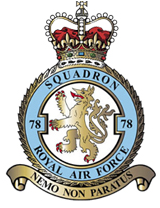
In early 1944 Bill married Maureen E. Keegan in Essex. She had been born in Kent in 1923, one of two daughters of Canadian army First World War veteran Herbert Leo Keegan (1888-1937) and Vera Keegan (nee Sergeant) (1899-1987). She had lived in Canada. Bill and Maureen are pictured left.
On 22nd September 1944 Bill was one of seven air crew on a Halifax III aircraft MZ763 (markings EY-S) that took off at 7.02 p.m. from R.A.F. Breighton in Yorkshire for an overnight raid on Neuss in Germany. It was his 31st operational mission. In the early hours of the following morning the aircraft was brought down by a German night fighter near Weert in the south-east of The Netherlands while on its way home.
Four of the seven-man crew managed to bail out before the aircraft hit the ground. Sergeant P. F. Robert and Sergeant J. S. Bennett made their way to Allied lines; Flight Sergeant A. T. Barnes landed in German controlled territory and was captured as a prisoner of war; while Sergeant (Flight Engineer) 1594041 Robert Lawrence Nutbrown (aged 37) died when his parachute failed to open.
22 year-old Bill, along with Flying Officer (Pilot) 161665 John Stewart Richardson Swanson (aged 22), and Sergeant (Wireless Operator) 2208436 Alistair Campbell (aged 20), did not escape from the aircraft and died in its wreckage.
The site of the crash is now marked by a memorial to the aircrew.
At the time of his death Bill's parents were still living in Moulsham Street, Chelmsford.
News of Bill going missing appeared in the Essex Chronicle on 29th September 1944:
"Missing from Rhur attack. Mr. T. H. Grew, of Moulsham Street, Chelmsford, has been informed that
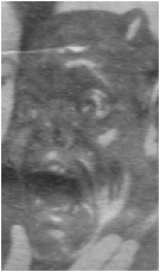
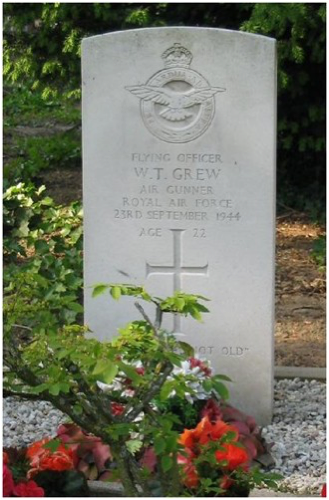
his son, Flying Officer (Air Gunner) William Grew is missing from the heavy R.A.F. bomber attack on the Ruhr on Saturday night. Flying Officer Grew, is 22, married and an old boy of the King Edward VI Grammar School, Chelmsford.”
Today he lies in Weert (Molenpoort) Roman Catholic Cemetery in the Netherlands (grave 2). His crew mates Alistair Campbell and John Swanson rest beside him. Robert Nutbrown is buried in a nearby cemetery in Nederweert.
Bill is commemorated by the King Edward VI's Grammar School Memorial.
140701